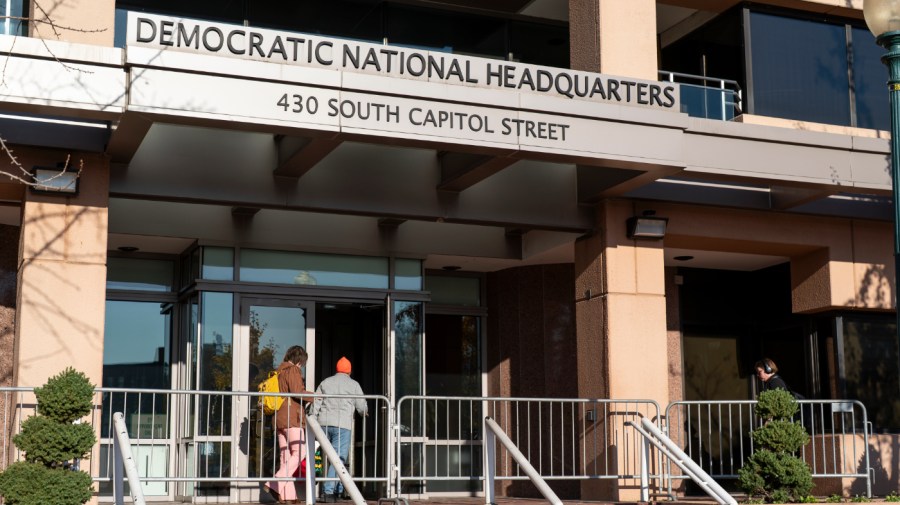
Our political disaster was a long time coming. It wasn’t just about individual circumstances or decisions of the Harris campaign, or whether President Biden should have stepped aside months before he did and allowed for a real open primary (both true).
The issue is that Democrats stopped talking to much of America years ago. And much of America took note.
I know. I’m a Democrat representing a New York State legislative district that Donald Trump won three times — most recently by 12 percent. This cycle he juiced his numbers in the rural belt of the district and made inroads in urban centers.
I did better. I outran Trump by double digits. This will be the eighth election where I’ve outrun both Democrats and Republicans by significant margins.
How I do it isn’t rocket science.
I show up everywhere. That means listening to farmers frustrated with the cost of bringing what they grow into the market; it means meeting with law enforcement to discuss what we can do to help them keep us safe. It means helping students grappling with automation, AI, and a fractured economy so they prosper post-graduation.
It means engaging voters who have drifted away from Democrats. And I know from thousands of conversations over the years that the disaffection is deep.
One reason? Most Democrats take direction from party leadership that’s become completely rooted in Washington, D.C., and elite circles in big cities — who are totally disconnected from most voters in multiple ways.
The two issues that my constituents were clear they cared about the most were economics, inflation and affordability; and public safety, including the border. Democrats didn’t listen. They told voters how they should feel rather than responded to how they were feeling.
Out of control prices were waved away as “a blip.” Mind-numbingly, many in the party let corporate America, raising prices sky-high, off the hook and rolling in profits – while households suffered, and we shouldered the blame.
Instead of treating crime and border worries as demanding a response, many Democrats dismissed voters’ concerns as racist. Some listened to Washington consultants who advised against addressing the issue at all, lest they “own it.”
Republicans filled the void and made damn sure we owned it, deftly moving public opinion. We ceded the argument or didn’t offer solutions until too late.
We approach politics through outdated lanes: “progressive”, “centrist”, or “conservative,” and the party sorts Americans into separate boxes, driven by activist and academic assumptions about identity.
But ask non-ideologues who represent non-affluent districts, and they’ll tell you that the concerns of white working- and middle-class voters are much the same as Black, Hispanic or Asian working- and middle-class voters.
You wouldn’t know it by the actions of our party. I know it from my work in my district.
Finally, Democrats have over-relied on performative language that sound like we’re running to lead a small liberal arts college instead of public office. It has sunk in with voters, who think we are annoying and out-of-touch.
I have yet to meet a Latino constituent who describes themselves as “Latinx.”
Similarly, few refer to “lived experiences,” — it’s real life, not a sociology course — or “economic justice,” which means, well, nothing. Talk about wealth creation, higher wages, retirement, affordable housing, class mobility and our kids being better off than us. It’s not a poetry class.
How do we bounce back?
First, we can’t look to the past in determining who will lead. Hopefully, Democrats, hungry to win again, will agree that a person who hasn’t lost a race should have a real crack at it. It’s why I am running.
The playbook we’ve used for decades must be discarded, and power brokers who haven’t had a big win since 2012 should not be who we look to for solutions. We need fresh ideas, messaging, and technology.
Second, the money we raise must be spent winning off-year races in 2025, taking back the House and Senate in two years, and the White House in 2028 — not bolstering a bloated Beltway bureaucracy or the consultant class. State and county parties must have every dollar they need.
Third, we should be sure that Democrats’ relationships with single issue identity-politics-focused groups — whose demands get continuously farther away from actual voters — are recalibrated.
Fourth, we treat every voter with equal respect and decency. We do not compromise on that. We embrace differences and create bridges by bringing people along. But we need to talk prices, not pronouns. We need to listen, not lecture.
Donald Trump and the sycophants that serve his corruption, grievances, and uncontrolled ineptitude, will overreach. They’ll be chaotic, will drive up costs, and make us less safe. I wager that once voters see Trump and an unchecked, radicalized right’s reality and its effects on their lives, they will recoil: particularly as he lines the pockets of corporate chieftains and the already wealthy. We must fight with spine, guts and ruthlessness because it’s right and so that voters see that we are fighting for their actual interests.
We also can’t win in any sustained way if all we are is the opposition to Donald Trump. It’s on us to make sure voters know what we stand for, not just what we are against.
There are 3,244 counties in the United States. We must show the residents of each that we understand, we’re strong, and we can help improve their lives. But we can’t change a thing if we don’t start winning elections again.
James Skoufis is a New York State senator running to chair the Democratic National Committee.












